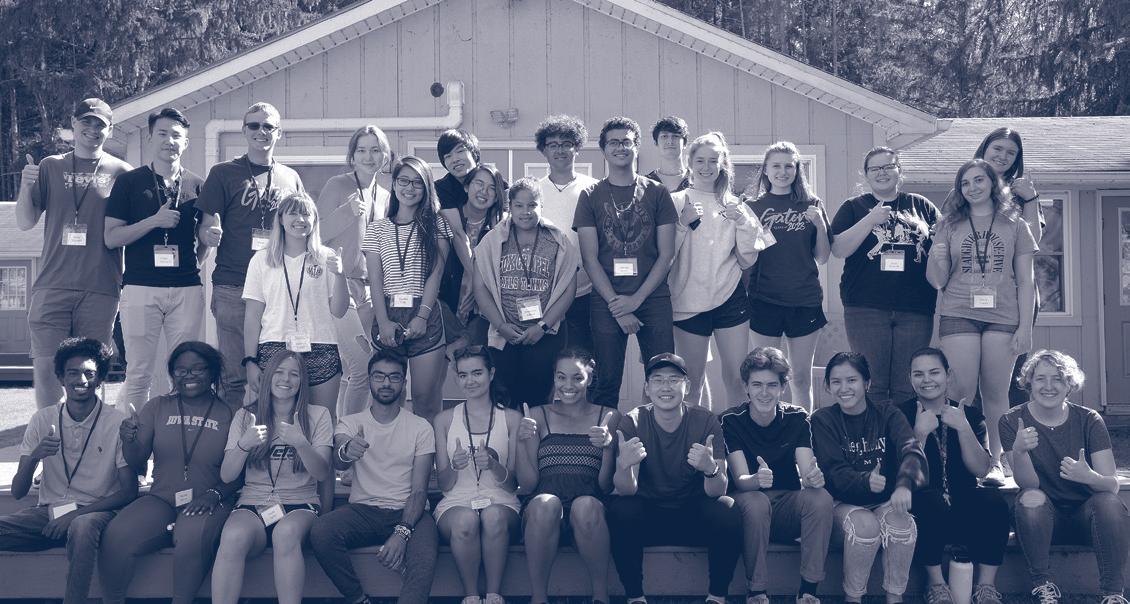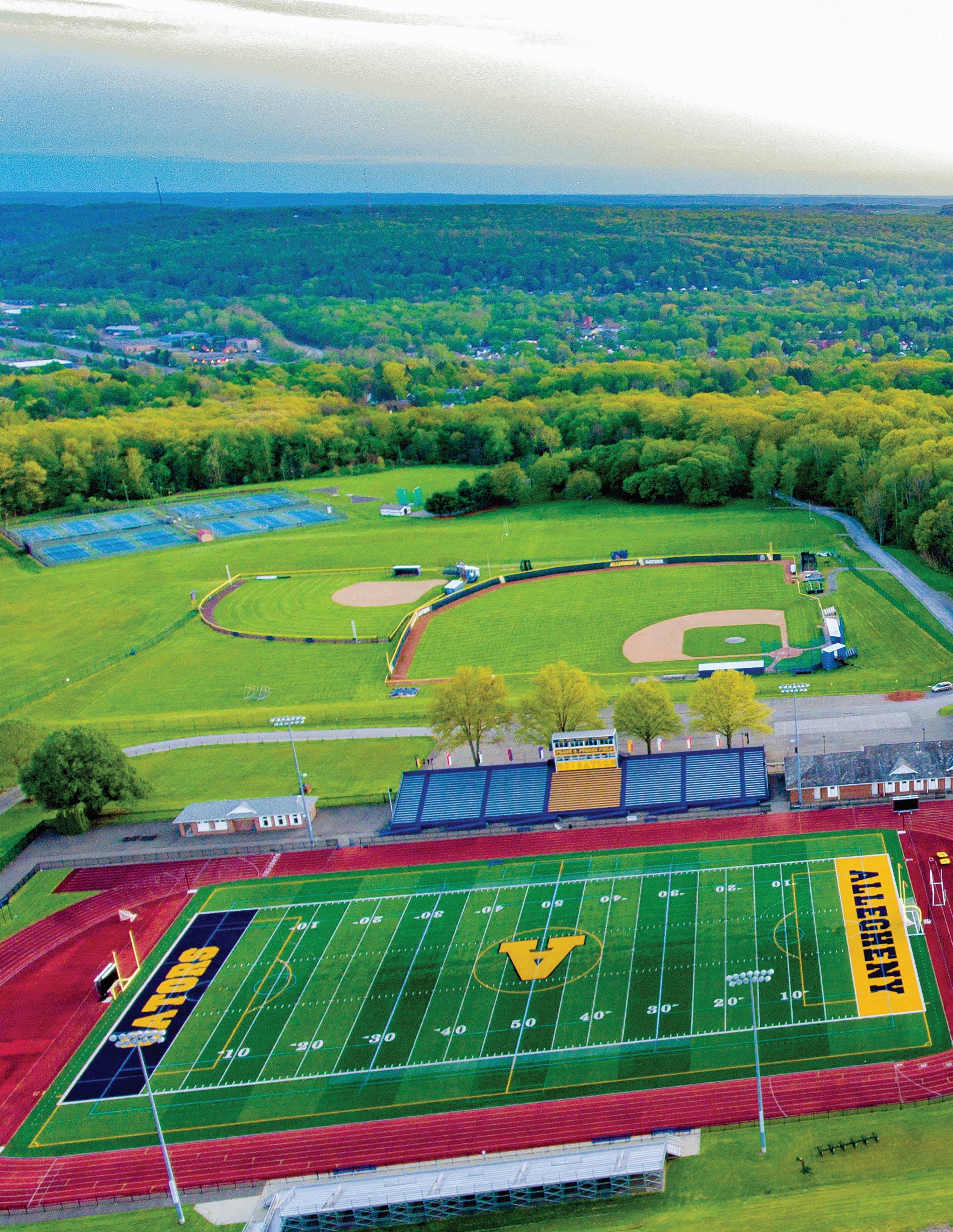
6 minute read
Global Citizens Scholar Program Empowers Through Local
When Linda Allison Palmiero ’66, P’92 first learned of the Global Citizen Scholars (GCS) Program and the distinctive experience it offers Allegheny students, she knew it was a perfect fit for her philanthropic interests.
Linda Allison Palmiero ’66 “The Global Citizen Scholars Program is very empowering,” she says, “and it does a tremendous job of integrating curricular and co-curricular opportunities and preparing students to go into leadership roles, from the local to the international level.”

In honor of her 50th reunion in 2016, Palmiero and her husband, Joe P’92, made a generous gift to fund the inaugural cohort of the GCS Program. Along with other donors, Palmiero has continued to support the program. It now has four cohorts fulfilling the goal of “encouraging students to interact with communities and cultures — not as observers, but as mindful participants.”
Each year, the GCS Program welcomes a cohort of up to 20 first-year students who apply to it as part of the admissions process at Allegheny. Participants selected for the program benefit from unique learning opportunities in three areas — civic engagement, global learning and U.S. diversity.
The power of combining those three areas in a single initiative inspired the founding of the GCS Program by Laura Reeck, professor of French and chair of the International Studies Program, and David Roncolato ’79, director of civic engagement in the Allegheny Gateway and professor in the Community and Justice Studies Program.
Two faculty co-lead each GCS cohort, selecting a theme that connects to their research expertise or teaching interests. Those themes have focused on refugees and asylum-seekers (Reeck and Roncolato); neurodiversity (Professors Monali Chowdhury and Eric Palmer); climate change and its impact on food, energy and water (Professors Rachel O’Brien and Byron Rich); and investments in empowering women (Professors Caryl Waggett and Ishita Sinha Roy). Several key experiences punctuate the three-year GCS Program: • Beginning in their first year, students enroll in a two-credit course that meets for three consecutive semesters. • In their second year, students participate in an ongoing civic engagement commitment in the Meadville community, participate in a shared immersion experience of two to four days, and begin preparations for their anticipated study abroad experience. (The program also includes two semesters of foreign language study.) • In their junior year, students study abroad or complete an international internship.
“Because students are doing one year of civic engagement work before they study abroad, that experience of being a part of a new community in Meadville locally is informing to their study abroad experience, where they also become part of a new community,” Reeck says.
A longtime volunteer for the College and past president of the Alumni Council, Palmiero interviewed each student in the program’s first cohort. She asked them to reflect on their experiences and how they grew as a result. “It exceeded my expectations and affirmed how great the program is,” says Palmiero, who also worked as an Allegheny employee for nearly 30 years. “Every single one of those 13 students mentioned how they learned to respect and listen to people with differing opinions.”
Emily Smith ’19 was among the members of the first GCS cohort. “Being part of the Global Citizen Scholars Program was the most unexpected but valuable component of my Allegheny experience because it touched so many areas of my life,” she says. “It was really so multifaceted, encouraging me to engage in the Meadville community and to study abroad. It helped me grow as a student and as a person.”
Smith says the program helped her to become a more confident speaker — in the classroom and outside of it. She adds that the cohort structure of the program allowed her to build relationships with students she might not otherwise have known as deeply.
While at Allegheny, Smith studied abroad in Chile and attended a conference in India. Ultimately, she says the GCS Program helped her to secure a Fulbright award to serve as an English teaching assistant in Brazil.
The GCS Program also led to a prestigious post-graduation experience for Danny Larson ’19. He served as a volunteer with the Peace Corps English and Culture for Communication program in Costa Rica, working alongside teachers to facilitate language lessons with more than 250 students in grades 7–12.
“The experiences the GCS Program provided, both nationally and internationally, pushed me out of my comfort zone and encouraged me to broaden my perspectives,” Larson says.
Along with the rest of his cohort, Larson worked with Catholic Charities in Erie to learn more about the difficulties and realities of the resettlement process for refugees. Through the financial support of the GCS Program, he also studied abroad in both Argentina and Nicaragua, enhancing his skills as a Spanish speaker.
“Traveling to the U.S.-Mexico border in Tucson, Arizona, during my senior year and being able to speak with multiple refugee seekers about their experiences in their native language was a hugely impactful experience,” Larson adds. “I recognized the power of human relationships. Through dialogue, we can connect with people who may have very different lived experiences than our own.”
Roncolato and Reeck offer gratitude to the donors who have generously supported the GCS Program, adding that it has garnered national attention for its structure and impact. Among those recognizing the program’s strengths is Caryn McTighe Musil, senior scholar and director of civic
Caryn McTighe Musil
Senior Scholar and Director of Civic Learning and Democracy Initiatives, Association of American Colleges and Universities learning and democracy initiatives at the Association of American Colleges and Universities.
“The creation of this well-thought-out leadership program showcases the distinctive strengths of Allegheny’s Gateway Initiative,” she says. “At the Association of American Colleges and Universities, we are searching for advanced programmatic examples, like the Global Citizen Scholars Program, that create the infrastructure which offers students immersive and integrative learning opportunities that are developmental in design and cumulative over time.”
Roncolato says the GCS Program also has delivered positive results in two key areas for the College: helping to retain students through their graduation from Allegheny and to attract international students. In addition, participants in the GCS Program distinguish themselves as “standout student leaders” in activities and organizations throughout campus, Reeck says. “They make a contribution that goes well beyond the (GCS) program itself.”
Global Citizen Scholar Asia Robinson ’19 completed an internship with the Meadville Council on the Arts and participated in the College Chorus and the Animal Welfare of Allegheny Club, among other activities. Robinson’s study abroad experience took her to Israel, where she worked in a wildlife rehabilitation center. That trip in turn helped to inspire her Senior Project exploring humananimal interactions.
Robinson says the GCS Program also helped to deepen her understanding that “people’s experiences and social issues are not one dimensional. It’s community work, but it’s not just about volunteerism. It’s about learning and researching and working together to understand the world from a different perspective.”














